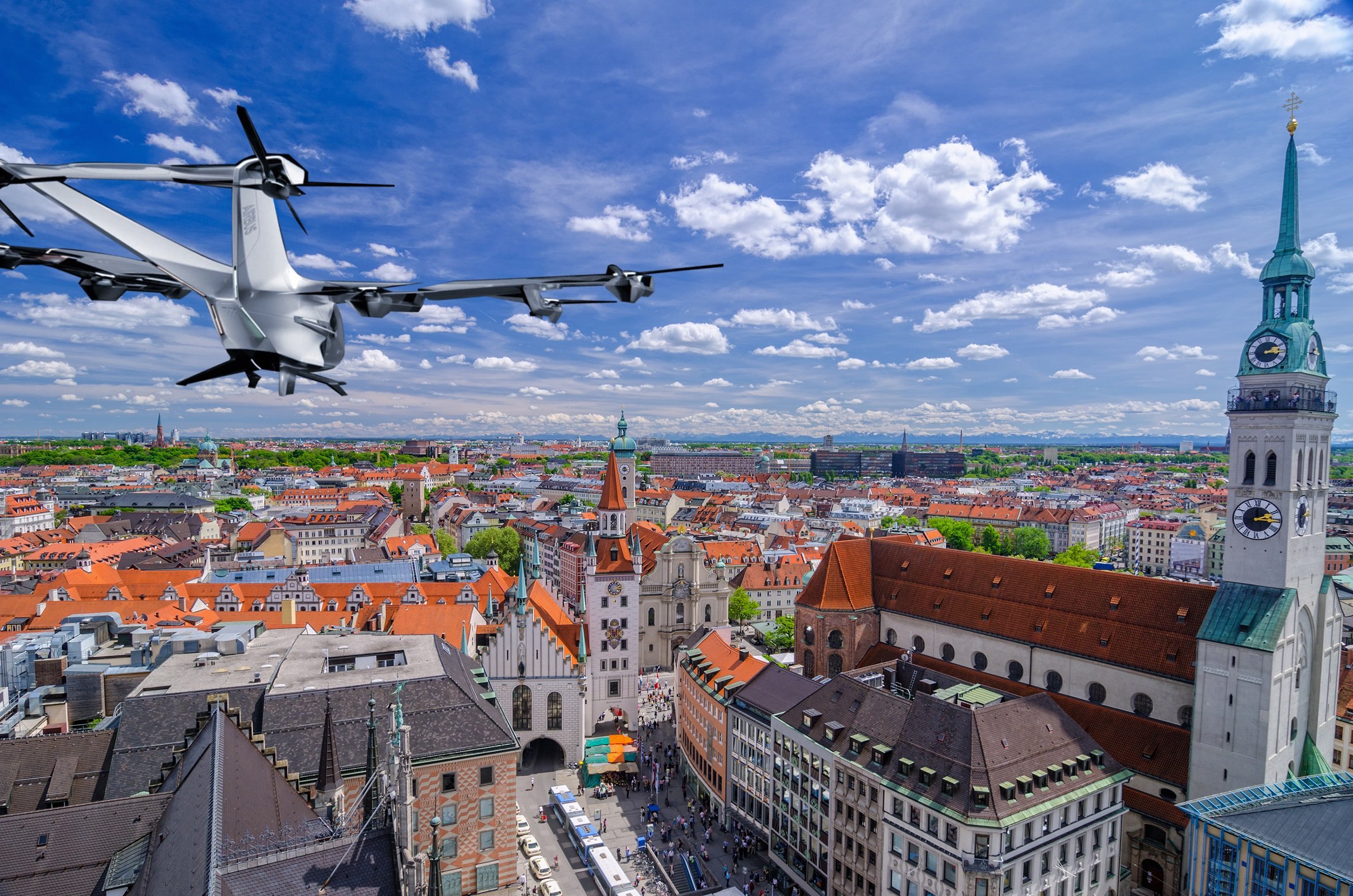Click Here to View This Page on Production Frontend
Click Here to Export Node Content
Click Here to View Printer-Friendly Version (Raw Backend)
Note: front-end display has links to styled print versions.
Content Node ID: 419536
The German city of Ingolstadt is to be the hub for the Air Mobility Initiative (AMI) launched on May 4 by Airbus and partners including Munich Airport, railway company Deutsche Bahn, aviation safety agency Deutsche Flugsicherung (DFS), uncrewed air traffic management (UTM) specialist Droniq, and Diehl Aerospace. With the support of the Bavarian state government and German federal officials, the project is intended to assess the basis on which commercial eVTOL air taxi operations could be launched to connect German cities, as well as to advance arrangements for UTM infrastructure and vertiports.
The AMI collaboration is backed by €86 million ($91 million) in public-private funding. This includes €24 million from the German federal government and €17 million from the state of Bavaria.
Situated around 50 miles north of Munich, Ingolstadt is a long-established hub for the automotive industry and the home to carmaker Audi. It is also close to the headquarters for Airbus’s defense business at Manching, and this site will be the first in a network of airspace sectors to be used for evaluating eVTOL operations. The city is close to Donauworth, where the Airbus Helicopters engineering team working on the aerospace group’s CityAirbus NextGen eVTOL design is based.
With an anticipated range of around 50 miles, the piloted CityAirbus is expected to be able to carry four passengers within larger cities like Munich and also to and from nearby cities like Ingolstadt and Nuremberg. Airbus is targeting type certification in 2025.
“In many parts of the world, eVTOLs will offer a whole new mobility service in the near future,” Markus May, head of operations for urban air mobility at Airbus, told a press conference. “Airbus and the AMI partners are aware that the introduction of such a system requires the cooperation of many players with different competencies. Our goal is to build a transport service that benefits society and this is what we are setting up here in Bavaria.”
In addition to Droniq, the UTM activities for AMI involve organizations such as Funke Avionics, SkyFive, BrigkAir, DFS, and Telekom, as well as academics from several universities in Munich and Hamburg.
Munich Airport is taking the lead on the ground infrastructure elements of the project. Efforts to establish suitable takeoff and landing sites for eVTOL aircraft are also being supported by Deutsche Bahn, Bauhaus Luftfahrt, Airport Nurnberg, and the universities of Ingolstadt and Munich.
The Air Mobility Initiative in southern Germany is part of a wider effort by Airbus to work with partners to develop an ecosystem for planned eVTOL services. In April, it announced a collaboration with Italian airline ITA Airways, and the company is also involved in the Re.Invent Air Mobility project in Paris, where it is working to plan routes with Aeroports de Paris and public transportation provider RATP.
Balkiz Sarihan, head of urban air mobility strategy execution and partnerships at Airbus, told FutureFlight that since the company unveiled its plans for the CityAirbus NextGen eVTOL aircraft in September 2021, the scope of the project has widened significantly. “We’ve been working on things beyond the vehicle itself, such as the complete ecosystem through which it will operate and how we will work with both production and operating partners,” she said.
“This will all help us to develop a true working model for an [advanced air mobility] ecosystem,” Sarihan added. “We need to find a way that this type of service can be integrated into cities and communities, and the approach could be different in various locations. So much of this is being built from scratch, and we need to know what the operations and passenger experience will look like; that will take a collaborative approach.”
In February, at the Heli-Expo show in Dallas, Airbus announced another partnership with the Helicopter Company, a Saudi Arabian operator. As with ITA Airways, the company is not yet committing to buying CityAirbus aircraft but is engaged in efforts to build a business case and operating model for eVTOL services. “We believe it is a natural place to start with [established air transport companies like] airlines and charter operators because here eVTOLs can be complementary and start feeder markets,” said Sarihan.
Meanwhile, ongoing discussions with EASA have continued over the certification path for the four-passenger aircraft through the new Special Conditions VTOL rules, and also for requirements for vertiports and operations. “There are questions around whether this will be considered more of a helicopter or a fixed-wing aircraft,” Sarihan explained. “We can be quite proud of how they [EASA] are taking a leading role in defining these standards, and it is very encouraging that EASA is talking to FAA and the CAA because interoperability [of certification requirements] is essential and we need these to converge.”
The CityAirbus engineering team is now supported by key partners including aerostructures specialist Spirit, aircraft systems group Diehl, and Thales, which is working on flight control systems with scientists from Stuttgart University. The company has yet to resolve where manufacturing will be conducted, but, given the anticipated high volumes of production, Sarihan suggested that this could involve multiple sites.
“How we will support and service the aircraft is also very important, and we are already thinking about this as we make design choices,” Sarihan concluded. “We want to achieve a simplicity of aircraft architecture and, through our logistics chain and training network across 153 countries, we will be ready to support customers.”
